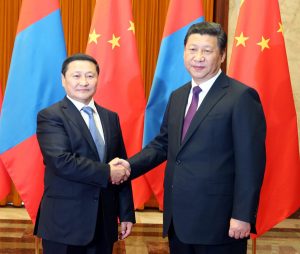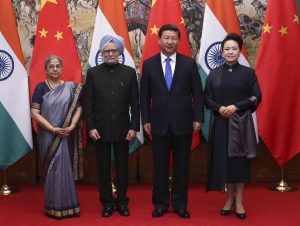Memo #249
By Jargalsaikhan Mendee – mendee [at] alumni.ubc.ca
 Lately, Chinese leaders have been busy bolstering relations with their immediate neighbours. As evidence, the Prime Ministers of India, Mongolia, and Russia arrived in Beijing for bilateral meetings with China’s President Xin Jinping and Premier Li Keqiang on the same day—October 24, 2013. While Russian Prime Minister Dmitri Medvedev secured $1.9 billion in loans for infrastructure projects as well as pledged to develop natural gas and oil projects with Chinese companies, Indian Prime Minister Dr. Manmohan Singh signed the much-anticipated Border Defense Cooperation Agreement with China and agreed to hold the Strategic Economic Dialogue to promote bilateral trade and investment. Finally, Mongolian Prime Minister Norovyn Altankhuyag secured markets for coal exports and agreed to collaborate with Chinese energy companies.
Lately, Chinese leaders have been busy bolstering relations with their immediate neighbours. As evidence, the Prime Ministers of India, Mongolia, and Russia arrived in Beijing for bilateral meetings with China’s President Xin Jinping and Premier Li Keqiang on the same day—October 24, 2013. While Russian Prime Minister Dmitri Medvedev secured $1.9 billion in loans for infrastructure projects as well as pledged to develop natural gas and oil projects with Chinese companies, Indian Prime Minister Dr. Manmohan Singh signed the much-anticipated Border Defense Cooperation Agreement with China and agreed to hold the Strategic Economic Dialogue to promote bilateral trade and investment. Finally, Mongolian Prime Minister Norovyn Altankhuyag secured markets for coal exports and agreed to collaborate with Chinese energy companies.
Given the importance of Chinese investment and the Chinese market to China’s neighbouring states, economic concerns are certainly a key driving force behind these states’ engagement with China. But from the Chinese side, these meetings showcase Beijing’s ability to pitch its appeal for strategic trust to its neighbours, and in so doing respond to American and Japanese containment policies in the context of “China Rising.”
The visits by the Russian and Mongolian prime ministers indicate, at least at the state-to-state level, that the Russian and Mongolian governments are committed to developing a “strategic partnership” with China. Similarly, Sino-Indian relations are progressing toward closer economic cooperation. The conclusion of their mutual border agreement indicates the desire of both governments to bracket the most difficult issue in order to increase ‘strategic trust’ between these two major regional powers. Clearly, China’s ‘good neighbor policy’ is attracting its important neighbours.
Beijing’s skillful arrangement for these three visits carries geopolitical significance. Russia and India stood against China during the Sino-Soviet and Sino-Indian conflicts, while Mongolia has long been regarded as a geo-political card against China. Even as the US and Japan increase their own political and security engagements with Mongolia and India, China’s same-day reception of the three prime ministers may signal a growing trust and confidence between China and its neighbours, or China’s growing power and influence over them.
About the Author:
Jargalsaikhan Mendee is a PhD student in the Department of Political Science at the University of British Columbia, and an Institute of Asian Research Fellow, 2013.

Chinese President Xi Jinping (right) meets with visiting Mongolian Prime Minister Norovyn Altankhuyag in Beijing, October 2013 (Source: Xinhua).
-
Links:
- “India-China ties a ‘strategic vision’: Indian PM,” Xinhua News, October 23, 2013
- “Russian Prime Minister begins official visit to China,” ITAR-TASS, October 22, 2013
- “Prime Minister of Mongolia and China Hold Official Talks” MONTSAME News, October 27, 2013
- “China Media: Indian PM’s visit,” BBC News, October 22, 2013

[…] Jargalsaikhan Mendee is a PhD student in the Department of Political Science at the University of British Columbia, and an Institute of Asian Research Fellow, 2013. He has also authored Memo #11, Memo #87, Memo #161, Memo #169, Memo #200, & Memo #249. […]
[…] on November 19, […]